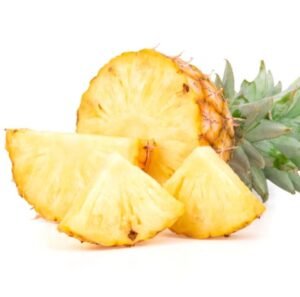Pineapple, with its tantalizing sweetness and exotic appeal, has a rich and storied history that stretches back centuries. From its humble origins in South America to its global spread and enduring popularity, the pineapple’s journey is a testament to its cultural significance and culinary allure. In this article, we’ll delve into the captivating history of pineapple, tracing its evolution from a prized symbol of luxury to a beloved tropical fruit enjoyed by millions worldwide.

1 ![]() . Origins in South America:
. Origins in South America:
The story of pineapple begins in the lush tropical regions of South America, where indigenous peoples cultivated and revered this fruit for its delicious taste and medicinal properties. Pineapples were cherished not only for their sweetness but also for their symbolic significance, representing hospitality, friendship, and warmth.
2 ![]() . Exploration and Global Spread:
. Exploration and Global Spread:
During the age of exploration, European explorers encountered pineapples during their voyages to the New World. Captivated by its unique flavor and appearance, they brought pineapple plants back to Europe, where they quickly became a symbol of wealth and luxury among the aristocracy.
3 ![]() . Pineapple Symbolism:
. Pineapple Symbolism:
In addition to its culinary appeal, pineapple became a powerful symbol in various cultures around the world. In Europe, pineapples were often featured in art, architecture, and royal gardens as a symbol of opulence and hospitality. In colonial America, pineapples were used as a decorative motif and a gesture of welcome in homes and public spaces.
4 ![]() . Industrialization and Commercialization:
. Industrialization and Commercialization:
With advancements in transportation and agriculture, pineapple cultivation expanded beyond its native regions to tropical climates around the world. The development of canning technology in the 19th century further revolutionized the pineapple industry, making this tropical fruit accessible to a broader audience year-round.
5 ![]() . Modern Pineapple Production:
. Modern Pineapple Production:
Today, pineapples are cultivated in tropical regions across the globe, including countries like Costa Rica, the Philippines, Thailand, and Indonesia. Modern agricultural practices, including sustainable farming techniques and technological innovations, have contributed to the efficient production and distribution of pineapples on a global scale.
6 ![]() . Pineapple in Popular Culture:
. Pineapple in Popular Culture:
Pineapple’s cultural significance extends beyond its culinary uses, influencing art, literature, and popular culture. From iconic images of pineapples in tropical-themed decor to references in literature and music, this fruit continues to captivate the imagination and evoke feelings of warmth and hospitality.
The history of pineapple is a testament to its enduring appeal and cultural significance throughout the ages. From its origins in South America to its global spread and symbolic meaning, the pineapple’s journey is a fascinating tale of exploration, commerce, and cultural exchange. As we enjoy this sweet and succulent fruit today, we can appreciate the centuries of history and tradition that have shaped our love for pineapple.
____________________________________________________![]() Best Agricultural Supplier For Export and Import
Best Agricultural Supplier For Export and Import
Vlux Vietnam Import Export Company Limited
Mobile/Whastapp/Wechat: +84 35 939 9345
www.vluxexim.com
Address: No. 58A Vo Van Dung Street, O Cho Dua Ward, Dong Da District, Hanoi City, Vietnam
#agriculturals #agriculturalVietnam #FlavorProfiles #VluxVietnam


